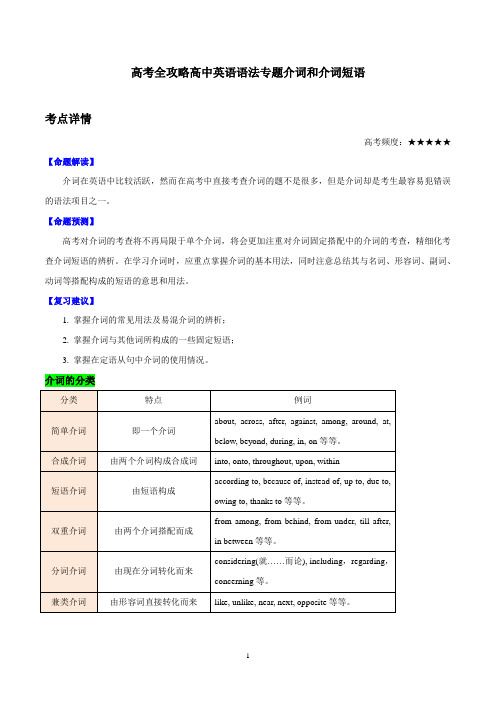2012年高考英语总复习之语法专题介词_3
2012年高考英语试题分项版解析Ⅰ专题03介词和介词短语(教师版)

1.(2012大纲卷)16. 100 ℃ is the temperature _________which water will boilA. forB. atC. onD. of【答案】B【解析】考查介词在定语从句中的前置。
temperature是which的先行词。
根据习惯用法“at the temperature”选B项。
句意:100 ℃是水沸腾的温度。
2.(2012北京卷)34. Do you think this shirt is too tight ________ the shoulders?A. atB. onC. toD. across3. (2012上海卷)25. passion, people won't have the motivation or the joy necessary for creative thinking.A. For .B. WithoutC. BeneathD. By【答案】B【解析】考查介词。
句意:没有激情,人们就不会拥有创造性思维所必须的动力和快乐。
4. (2012安徽卷)25.You can change your job, you can move house, but friendship is meantto be life.A. ofB. onC. toD. for【答案】D【解析】考查介词。
句意:你可以换工作,可以搬家,但友谊是一辈子不变的。
” 只有“for”表示动作的持续。
“for life ”所以选 D项。
5.(2012福建卷)33. Nothing is so easy as _____ parents to raise their expectations of their children too high.A. ofB. toC. byD. for6. (2012江苏卷)29.— Thank God you're safe!—I stepped back, just to avoid the racing car.A. in timeB. in caseC. in needD. in vain【答案】A【解析】考查介词短语。
高考全攻略高中英语语法专题介词和介词短语

高考全攻略高中英语语法专题介词和介词短语考点详情高考频度:★★★★★【命题解读】介词在英语中比较活跃,然而在高考中直接考查介词的题不是很多,但是介词却是考生最容易犯错误的语法项目之一。
【命题预测】高考对介词的考查将不再局限于单个介词,将会更加注重对介词固定搭配中的介词的考查,精细化考查介词短语的辨析。
在学习介词时,应重点掌握介词的基本用法,同时注意总结其与名词、形容词、副词、动词等搭配构成的短语的意思和用法。
【复习建议】1. 掌握介词的常见用法及易混介词的辨析;2. 掌握介词与其他词所构成的一些固定短语;3. 掌握在定语从句中介词的使用情况。
介词的分类考向①介词短语的功能介词不能独立在句中做成份,介词后必须与名词、代词、或动名词构成介词短语在句中充当一个成分,表示人、物、事件等与其它人、物、事件等之间的关系。
介词短语的功能例句作定语They didn’t find the solution to the problem.作状语We have breakfast at seven.(表时间)They were late for the meeting because of the heavy rain.(表原因)What do you mean by doing such a thing?(表方法)Nothing in the world could live without air or water.(表条件)作表语When I paid a visit to you yesterday, you were not at home.作宾语补足语I found the old building in a bad condition.考向②常考介词的辨析介词是英语中最活跃的词类之一,使用频率相当高,其用法跟冠词一样复杂。
但根据近年来高考命题的情况来看,考生需要掌握以下内容。
1.表示相同或相似概念的介词(短语)的区别表示的概念介词(短语)区别例时间inonatat在一个时间点上;in在一段的时间之内;on在具体日子。
超实用高考英语复习语法专题:介词

2. The old man died___o_f______ hunger on a cold night.
那位老人饿死在一个寒冷的晚上。
6
3. The little girl's hands turned red___w__it_h____ cold. 小女孩的手冻红了。 4. A number of smokers died __o_f/_f_ro_m____ lung cancer. 许多吸烟者死于肺癌。
9. The theft happened_____a_t____ noon, when all the workers were sleeping.
4
10. Did you witness the traffic accident ___o_n______ a rainy morning?
11. Traffic jams are quite usual ___o_n______ Friday afternoon.
4
19. 直到什么时间用until 20.从过去时间点到现在用介词since
5 表示地点,方向/方位的介词有哪些?
根据汉语提示,填写正确的介词
1. _a_t________ 2. _i_n________ 3. _o_n________ 4. _o_n________ 5. _a_b_o_v_e_____ 6. _o_v_e_r______ 7. _u_n_d_e_r_____
3
介词短语/词组在句中作定语,表语,状语,(主/ 宾)补语,或独立成分。
4 常见表示时间的介词有哪些?
在句中空格上填上适当的介词,并总结其用法规 律
1. What will happen ____i_n_____ the 22nd century?
2012年高考英语总复习之语法专题介词

2012年高考英语总复习之语法专题:介词介词属于虚词,又叫做前置词,介词一般不能单独使用,后面往往要接名词,代词或动名词作宾语。
早、午、晚要用in例:in the morning 在早上 in the afternoon 在下午 in the evening 在晚上in the day 在白天at黎明、午、夜、点与分例: at dawn/at daybreak 在黎明时候 at noon 在中午 at night 在夜间at midnight 在午夜以上短语都不用冠词at six o'clock 在6点钟 at 7:30 (seven thirty) 在7点半at half past eleven 在11点半 at nine fifteen 在9点15分at ten thirty a.m. 在上午10点30分也可以写成seven to five 5点差7分(半小时以上) five minutes after two 2点过5分at a quarter to two 1点45分 at the weekend 在周末年、月、年月、季节、周即在"来年",在"某月",在"某年某月" (但在某年某月某日则用on),在四季,在第几周等都要用in。
例;in 1986 在1986年 April 在四月 July l983 1983年7月in spring 在春季 in summer 在夏季 n autumn 在秋季 in winter 在冬季in the fist week of this semester 这学期的第一周 n the third week 在第三周阳光、灯、影、衣、冒 in,即在阳光下,在灯下,在树阴下,穿衣、着装、冒雨等都要用in。
例:Don't read in dim light. 切勿在暗淡的灯光下看书。
They are reviewing their lessons in the bright light. 他们在明亮灯光下复习功课。
高考英语一轮复习 语法点专题讲解 介词

介词介词又叫做前置词,是一种虚词,不能单独在句子当中担当成分,它后面必须接名词、代词或相当于名词的其他词类搭配(介词+宾语)构成介词短语;和动词搭配构成短语动词,然后才能够在句子当中充当成分。
介词分为简单介词,如:at, in, on, besides, since, for等;合成介词,如:inside, outside, without, within, into, onto等;短语介词(或成语介词),如:because of, in front of, instead of, in spite of等;二重介词,如:from behind, until after等。
一、介词短语的句法功能介词在句子中可以充当定语、状语、表语、以及宾语补足语等。
1.作定语介词短语在句中做定语时须位于被修饰词之后。
The key to the door is missing.The water-tower in front of our school was built in 1988.2.作表语(或称为:主语的补足语)Some students are in the classroom, and some on the playground.As we know, Japan is to the east of China.3.作宾语补足语(或称为:宾语的表语)Did you see a pen under my desk this morning?They have sent another rocket into the sky.4.作状语1)On Sundays, the family are mostly out. (时间状语)2)On top of the hill stands a TV tower. (地点状语)3)He is used to sleeping with all the windows open. (伴随状语)4)In the search for the lost child, the villagers went all out. (目的状语)5)All the work must be done by hand. (方式状语)6)At times, I go to the cinema. (频度状语)7)She is by fa r the best student in our class. (程度状语)8)Because of poverty, he couldn’t go to school. (原因状语)9)To my surprise, he got the first prize in the contest. (结果状语 / 或评注性状语)10)Without our Party, we couldn’t live a happy life. (条件状语)11)In spite of great efforts we failed to carry our plans through. (让步状语)12)As a matter of fact, nobody agreed to his project. (评注性状语)In my opinion,you’d better go with us.二、介词的复合结构“介词+宾语+补足语”可以构成介词的复合结构,在句子当中可充当表语、定语、状语、补语等。
高考英语语法复习专题_—_介词

for, at, on/upon, with, by, through, from, in, of on 3) He came to see me ____business. on 4) He came ____your invitation.
on/upon: (表示为某事物的 基础、根据或理由)由于,因 为 所表示的原因与条件直接 相关。
by 迟于;到…为止。 后跟表示过去的时间用 过去完成时,跟将来的 时间用将来完成时。
in, on, from, at, until, for, since, after, before
by, during, over, through, within, upon, till
through 7)They played the cards ________the night.
还有due to, owing to, thanks to, because of 四个成语介词表示“因为”、“由于”
2. 表示时间的介词 in, on, from, at, until, for, since, after, before by, during, over, through, within, upon 1) He came in 1958 and has stayed here since then. ______
from 表示自然的或直接的原因
for, at, on/upon, with, by, through, from, in, of
9)Don’t get tired of __life; you are still young. 不要对生活厌倦;你还年轻。 of playing basketball. 10)He is very fond __ 他非常喜欢打篮球。 of 11)The beggar died __hunger and cold. 那乞丐因饥饿和寒冷而死。 of 常用来表示情绪上的原因,因 此常常与glad, fond, proud, shamed, tired 同时等形容词连用
2012届高考英语语法专题复习精品课件集合介词

between。如:They don’t know the difference between wheat, oats and barley.
2020/1/28
11.besides, except, but, except for:besides 指“除了……还有,再加上”。如:All went out besides me.;except指“除了,减去什 么”,不能放在句首。如:All went out except me;but 与except意思近似,表示“除 了……外”经常用在no, all, nobody, anywhere, everything等和其他疑问词后面。 如:I never saw him reading anything but the newspaper. except for表示“如无……就,只是” 表明理由细节。如:His diary is good except for a few spelling mistakes.
16.in, into:into表示动向,不表示目的地或位置。 如:We walked into the park. in通常表示位 置。如:We walked in the park. in和drop, fall, put, throw, break等终止性动词连用时, 也可以表示动向。如:I have put the coin in (into) my pocket.我把硬币放进衣袋。
2020/1/28
8.in the end, at the end of, by the end of:in the end作“最后”、“终于”解,可 单独使用,后不接介词of;at the end of 表 示“在……末梢”,“到……尽头”,既可指 时间,也可以指地上或物体。不可单独使用; by the end of 作“在……结束时”,
高考语法填空常考介词短语

高考语法填空常考介词短语1.由at构成的短语At dawn拂晓At sunrise日出时At noon中午At night夜晚At table在用餐At college在上大学At last最后At a time一次At times有时候At the same time同时At all costs不惜一切代价At least至少At will任意地At the thought of一想到At daybreak黎明At sunset/sundown日落时At dusk黄昏At home在家At school在上学At risk有危险,冒险At rest静止不动At one time曾经At all time总是At present目前At first最初At most至多At random随机地At the sight of一看到2.由by构成的短语By accident/chance偶然By turns轮流By check用支票By mistake错误地By no means决不By e-mail通过电子邮件By credit card用信用卡By birth出身By means of借助……手段By the way顺便说一句3.由from构成的短语From memory凭记忆From day to day日复一日From now on 从现在起From then on从那时起From bad to worse越来越糟From cover to cover从头至尾From beginning to end 从头到尾From head to foot从头到脚From time to time时不时地4.由in构成的短语In high/poor/bad spirits情绪高涨/低落/差In tears热泪盈眶In fear在恐惧中In danger在危险中In peace和平相处In surprise惊讶地In trouble陷入困境In safety很安全In need有需要In good order很整齐In silence静静地In doubt有疑问In print在印刷In a sense从某种意义上来说In flower在开花In advance事先In the meantime同时In case假使In case of如果发生In fact实际上In general一般说来In turn 轮流In public公开地In short总之In one’s opinion在某人看来In no time立刻In all总共In brief简而言之In good condition状况好In order井井有条In other words换句话说In return作为报答In the course of在……过程中In the end最后In the long run从长远来看5.由on构成的短语On board乘(车,飞机)On duty值班On fire着火On earth到底On holiday/vacation度假On trial在受审On strike罢工On show在上映On (the) average平均On purpose故意地On the contary相反On the way在途中On call听候召唤On guard在岗On foot步行On hire雇用On business出差On sale在出售/在打听On a visit在访问On watch在站岗/放哨On the spot当场On the rise在上升On the phone在打/接电话On time准时6.由Of构成的短语Of+抽象名词=形容词Of+great / much+抽象名词=very + 形容词如:It is of great / much value.=It is very valuable.Of+no+抽象名词=not + 形容词如:It is of no use.=It is not useful.=It is useless.7.由out of构成的词组Out of breath气喘吁吁Out of control失去控制Out of danger脱险Out of work失业Out of date过时Out of fashion不时尚Out of order发生故障Out of shape变形Out of reach拿不到Out of touch失去联系Out of the question不可能Out of question没问题8.由to构成的短语To与情感名词连用,表示“某种行动后产生的感觉”To one’s delight/surprise/horror/sorrow/joy/reget=to the delight/ surprise /horror /sorrow /joy / reget of sb.这种表达法表示结果,用作状语,位置前、中、后皆可。
- 1、下载文档前请自行甄别文档内容的完整性,平台不提供额外的编辑、内容补充、找答案等附加服务。
- 2、"仅部分预览"的文档,不可在线预览部分如存在完整性等问题,可反馈申请退款(可完整预览的文档不适用该条件!)。
- 3、如文档侵犯您的权益,请联系客服反馈,我们会尽快为您处理(人工客服工作时间:9:00-18:30)。
2012年高考英语总复习之语法专题:介词介词属于虚词,又叫做前置词,介词一般不能单独使用,后面往往要接名词,代词或动名词作宾语。
早、午、晚要用in例:in the morning 在早上 in the afternoon 在下午 in the evening 在晚上in the day 在白天at黎明、午、夜、点与分例: at dawn/at daybreak 在黎明时候 at noon 在中午 at night 在夜间at midnight 在午夜以上短语都不用冠词at six o'clock 在6点钟 at 7:30 (seven thirty) 在7点半at half past eleven 在11点半 at nine fifteen 在9点15分at ten thirty a.m. 在上午10点30分也可以写成seven to five 5点差7分(半小时以上) five minutes after two 2点过5分at a quarter to two 1点45分 at the weekend 在周末年、月、年月、季节、周即在"来年",在"某月",在"某年某月" (但在某年某月某日则用on),在四季,在第几周等都要用in。
例;in 1986 在1986年 April 在四月 July l983 1983年7月in spring 在春季 in summer 在夏季 n autumn 在秋季 in winter 在冬季in the fist week of this semester 这学期的第一周 n the third week 在第三周阳光、灯、影、衣、冒 in,即在阳光下,在灯下,在树阴下,穿衣、着装、冒雨等都要用in。
例:Don't read in dim light. 切勿在暗淡的灯光下看书。
They are reviewing their lessons in the bright light. 他们在明亮灯光下复习功课。
They are sitting in the shade of a tree. 他们坐在树阴下乘凉。
a prisoner in irons 带着镣铐的囚犯He went in the rain to meet me at the station. 他冒雨到车站去接我。
The poor dressed in rags in old society. 旧社会穷人们衣衫褴褛.以及:a merchant in disguise 乔装的商人the woman in white (black, red, yellow) 穿着白(黑、红、黄)色衣服的妇女in uniform 穿着制服 in mourning 穿着丧服in brown shoes 穿着棕色鞋 in his shirt sleeves 穿着衬衫in+ 一段时间在...以后常与将来时态连用例: They will come back in 10 days. 他们将10天以后回来。
We'll be back in no time. 我们一会儿就回来。
after...在。
之后多与一般过去时连用。
但如果后接点时间时,往往和将来时连用He will leave after 6 o’clock.小处at大处in例:Li and I arrived at Heishan county safe and sound, all is well. Don't worry. 李和我平安地到达黑山县,一切很好,勿念。
I live in a great city (big city), my sister lives at a small town while my parents live at a village. 我住在大城市,我姐姐住在一个小城镇,而我的父母则住在农村。
I'm at Anshan in Liaoning. 我住在辽宁省鞍山市.有形with无形by,语言、单位、材料in例:The workers are paving a road with stone. 工人们正用石子铺路。
(有形)The teacher is correcting the paper with a new pen. 这教师正用一支新笔批改论文(有形)"Taking Tiger Mountain by Strategy" is a good opera.智取威虎山是出好戏。
(无形)The product is separated by distillation into gasoline and gas oil. 这种产品是用蒸馏分离出气油和粗柴油。
(表示方式、手段、方法--无形)I really can't express my idea in English freely in-deed.我确实不能用英语流利地表达我的思想。
(表示某种语言用in)I wrote a novel in Russian. 我用俄语写了一本小说。
(同上)The kilometer is the biggest unit of length in the metric system.公里是米制中最长的长度单位。
(表示度、量、衡单位的用in )The length is measured in meter, kilometre, and centimetre. 长度是以米、公里、厘米为单位来计算的。
(同上)This board was cast in bronze not in gold. 这个牌匾是铜铸的,不是金铸的。
特征、状态、方面与方式、心情、成语惯用in特征、状态:The Democratic Party was then in power. 那时民主党执政。
They found the patient in a coma. 他们发现病人处于昏迷状态。
He has not been in good health for some years. 他几年来身体一直不好。
Many who came in despair went away in hope. 许多人带着绝望情绪而来,却满怀希望而去。
The house was in ruins. 这房屋成了废墟。
The poor girl was in tears. 这个贫苦女孩泪流满面。
Her clothes were in rags. 她的衣跟穿破了。
She spoke in grief rather than in anger. 与其说她讲得很气愤,不如说她讲得很伤心。
His mind was in great confusion. 他脑子里很乱。
She and her classmates are in flower ages. 她和她的同学都正值妙龄。
方面:例:we accepted the item in principle. 我们在原则上接受了这个条款。
A good teacher must be an example in study. 一个好的教师必须是学习的模范。
方式:All the speeches were taken down in shorthand. 所有报告都用速记记录下来了。
The Party has always educated us in the spirit of patriotism and internationalism. 党一贯以爱国主义和国际主义精神教育我们。
如下成语惯用in例如: in all 总计 in advance 事前 in the meantime 与此同时in place 适当地 in hopes of(或in the hope of) 怀着.......希望in connection with 和……有关 in contact with 和……联系in addition to 除......以外 in case of 倘若,万一 in conflict with 和......冲突in force 有效的,大批 in depth 彻底地 in regard to 关于in the neighborhood of 大约、邻近 in retrospect 回顾,一想起in behalf of 代表......利益 in the least 一点,丝毫 in alarm 惊慌、担心in the opinion of 据……见解 in the long run 从长远说来in one's opinion 在……看来 in word 口头上 in a word 总之in vain 无益地, 白白地 in case 如果,万一,以防 in detail 详细地in haste 急急忙忙地 in conclusion 总之 in spite of 尽管in other words... 换句话说 in return 作为回报 in the name of 以......名义be confident in 对......有信心 be interested in 对......感兴趣in doubt 怀疑 in love 恋爱中 in debt 负债 in fun (jest、joke) 玩笑地in hesitation 犹豫不决 in wonder 在惊奇中 in public (secret) 公开他(秘密地)in a good humour 心情(情绪)好"介词at、to表方向,攻击、位置、善、恶、分"。
介词at和to都可以表示方向; 用at表示方向时,侧重于攻击的目标,往往表示恶意;用to表示方向时,突出运动的位置或动作的对象,侧重表示善意。
试比较下列各句:1. A.She came at me. 她向我扑过来。
B.She came to me. 她向我走过来。
2.A.Jake ran at John. 几杰克向约翰扑过去。
B.Jake ran to John. 杰克朝约翰跑去。
3.A. He rushed at the woman with a sword. 他拿着剑向那妇女扑过去。
B. He rushed to the woman with a sword. 他带着剑向那妇女跑过去。
4.A.He shouted at the old man. 他大声喝斥那老人。
B. He shouted to the old man. 他大声向那老人说5.A. She talked at you just now. 她刚才还说你坏话呢。
